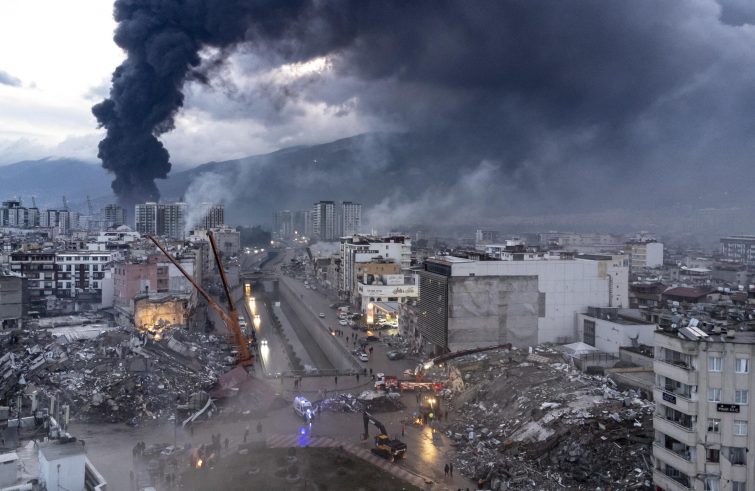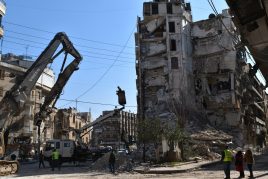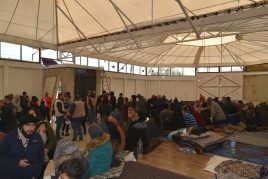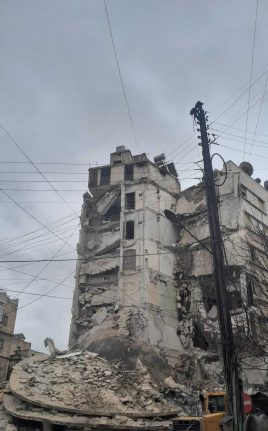
More than 34,000 people were killed in the earthquake that struck Turkey and Syria on Feb. 6. The provisional toll sees 29605 dead in Turkey and 4,574 in Syria, of whom more than 3,160 are from the northwest areas controlled by the opposition to the Damascus regime. In the hardest hit centers, excavations are still under way in hopes of extracting more people alive as happened in Hatay (Turkey) where a 7-month-old baby was rescued after 140 hours, a 35-year-old after 150 and a 55-year-old after 159.
 The war over aid. There is no shortage of controversy over aid delays especially in Syria, where humanitarian aid is being politically exploited by President Assad’s Regime and the rebels who control Idlib Governorate. Yesterday, a private aid convoy sent from Italy, delivered by Italian military vehicles, arrived in Syria through Lebanon. It was the first aid convoy from a European country to reach its destination in Syria, the official Sana news agency reported. The aid included four ambulances and tons of medical and health supplies. On the other hand, the delivery of aid to Idlib by the United Nations did not go well, as Filippo Agostino, Syria liaison for the Avsi Foundation, tells Sir: “The United Nations said that a humanitarian convoy that left Damascus as part of cross-border operations (cross-line and cross-border operations) was blocked by rebels.” Martin Griffiths, head of U.N. humanitarian operations, admitted during a visit to the border area that the United Nations had failed to deliver aid to people in the opposition-controlled region of Syria. “It will be our task to fix this problem as quickly as possible,” he said.
The war over aid. There is no shortage of controversy over aid delays especially in Syria, where humanitarian aid is being politically exploited by President Assad’s Regime and the rebels who control Idlib Governorate. Yesterday, a private aid convoy sent from Italy, delivered by Italian military vehicles, arrived in Syria through Lebanon. It was the first aid convoy from a European country to reach its destination in Syria, the official Sana news agency reported. The aid included four ambulances and tons of medical and health supplies. On the other hand, the delivery of aid to Idlib by the United Nations did not go well, as Filippo Agostino, Syria liaison for the Avsi Foundation, tells Sir: “The United Nations said that a humanitarian convoy that left Damascus as part of cross-border operations (cross-line and cross-border operations) was blocked by rebels.” Martin Griffiths, head of U.N. humanitarian operations, admitted during a visit to the border area that the United Nations had failed to deliver aid to people in the opposition-controlled region of Syria. “It will be our task to fix this problem as quickly as possible,” he said.
 Médecins Sans Frontières, which has long been active in northwestern Syria, also laments, in the words of its project leader for the intervention in Idlib, Ahmed Rahmo, “the very little international support. The needs here are immense: more than 2 million people live in camps for displaced people, they need everything, food, water, clothing, blankets. And now they are also having to cope with a resurgence of the cholera epidemic. Shelters have been set up to accommodate more displaced people. So far there are 15 in the Idlib region, and in five of them we have deployed mobile clinics to provide medical care. Transferring medical supplies from Turkey to Syria was already a challenge, as Bab al-Hawa was the only crossing point for humanitarian convoys to northwestern Syria and was subject to political tension before the earthquake. After the earthquake, the crossing was closed for three days and reopened two days ago, with very little traffic so far.” There are also problems on President Assad’s government forces’ side. The Italian NGO “Un Ponte Per,” which has been very active in northeastern Syria for years, has denounced them. According to what the NGO told Sir, a convoy of aid from the Kurdish Red Crescent (Krc) headed from northeastern Syria to Aleppo, which was also supposed to reach the surrounding villages most affected by the tremors, was blocked in the late afternoon of Saturday, Feb. 11, by government forces. “The government in Damascus,” denounces the NGO, “is demanding that the Crescent deliver all aid in order to pass the check-point, despite the fact that health workers have made it clear that they also intend to bring aid to regime-controlled areas. Government forces say they will make the same demand of all local and international NGOs that want to bring aid to the Northwest. This is an absolutely unacceptable level of political instrumentalization of aid,” Un Ponte Per declared, “which, among other things, opens the door to corruption and deprives the relief workers of the ability to control aid recipients, holding donors accountable. The convoy of the Kurdish Red Crescent, supported by fundraising campaigns also activated in Italy by Un Ponte Per, consists of three trucks loaded with tents, mattresses, blankets, heating materials and medicine, followed by two ambulances and two cars with health workers and technicians. “We call for an immediate intervention of the Italian and European diplomatic authorities with the government in Damascus to allow the convoy access to Aleppo and to prevent similar cases to recur in these coming days with other NGOs,” Un Ponte Per strongly urges.
Médecins Sans Frontières, which has long been active in northwestern Syria, also laments, in the words of its project leader for the intervention in Idlib, Ahmed Rahmo, “the very little international support. The needs here are immense: more than 2 million people live in camps for displaced people, they need everything, food, water, clothing, blankets. And now they are also having to cope with a resurgence of the cholera epidemic. Shelters have been set up to accommodate more displaced people. So far there are 15 in the Idlib region, and in five of them we have deployed mobile clinics to provide medical care. Transferring medical supplies from Turkey to Syria was already a challenge, as Bab al-Hawa was the only crossing point for humanitarian convoys to northwestern Syria and was subject to political tension before the earthquake. After the earthquake, the crossing was closed for three days and reopened two days ago, with very little traffic so far.” There are also problems on President Assad’s government forces’ side. The Italian NGO “Un Ponte Per,” which has been very active in northeastern Syria for years, has denounced them. According to what the NGO told Sir, a convoy of aid from the Kurdish Red Crescent (Krc) headed from northeastern Syria to Aleppo, which was also supposed to reach the surrounding villages most affected by the tremors, was blocked in the late afternoon of Saturday, Feb. 11, by government forces. “The government in Damascus,” denounces the NGO, “is demanding that the Crescent deliver all aid in order to pass the check-point, despite the fact that health workers have made it clear that they also intend to bring aid to regime-controlled areas. Government forces say they will make the same demand of all local and international NGOs that want to bring aid to the Northwest. This is an absolutely unacceptable level of political instrumentalization of aid,” Un Ponte Per declared, “which, among other things, opens the door to corruption and deprives the relief workers of the ability to control aid recipients, holding donors accountable. The convoy of the Kurdish Red Crescent, supported by fundraising campaigns also activated in Italy by Un Ponte Per, consists of three trucks loaded with tents, mattresses, blankets, heating materials and medicine, followed by two ambulances and two cars with health workers and technicians. “We call for an immediate intervention of the Italian and European diplomatic authorities with the government in Damascus to allow the convoy access to Aleppo and to prevent similar cases to recur in these coming days with other NGOs,” Un Ponte Per strongly urges.
 Aleppo. A total of 179 shelters have opened in Aleppo as a result of an increase in the number of earthquake victims who have lost their homes. Since Friday, the United Nations has also arrived in the Syrian city. “Avsi,” Agostino reports, “is arranging for aid to also be brought to inland and coastal areas where the need is greatest. But there are many needs: large mechanical equipment is needed to dig through the rubble, plus medicine and medical supplies for operations, food and assistance for the winter. Medical supplies are needed to cope with cholera, tetanus and pneumonia, and sanitation supplies are necessary to keep large environments such as shelters clean. One thing to keep in mind is that there is no electricity in Syria. In some areas it only comes on for two hours a day. In the next two weeks,” Augustine explains, “we will give the most vulnerable families economic support to restore their homes, where possible, or to pay rent (six months). This week the Aleppo municipality and UNHCR are mapping the damaged buildings – of which 54 have collapsed to date – with the technical assistance of 100 engineers, the hope is that many families will be able to return to their homes. Indeed, the thing to be avoided is for them to remain in shelters for a long time. In one of them,” says Augustine, “a baby was also born, which is good news in the midst of so much tragedy.
Aleppo. A total of 179 shelters have opened in Aleppo as a result of an increase in the number of earthquake victims who have lost their homes. Since Friday, the United Nations has also arrived in the Syrian city. “Avsi,” Agostino reports, “is arranging for aid to also be brought to inland and coastal areas where the need is greatest. But there are many needs: large mechanical equipment is needed to dig through the rubble, plus medicine and medical supplies for operations, food and assistance for the winter. Medical supplies are needed to cope with cholera, tetanus and pneumonia, and sanitation supplies are necessary to keep large environments such as shelters clean. One thing to keep in mind is that there is no electricity in Syria. In some areas it only comes on for two hours a day. In the next two weeks,” Augustine explains, “we will give the most vulnerable families economic support to restore their homes, where possible, or to pay rent (six months). This week the Aleppo municipality and UNHCR are mapping the damaged buildings – of which 54 have collapsed to date – with the technical assistance of 100 engineers, the hope is that many families will be able to return to their homes. Indeed, the thing to be avoided is for them to remain in shelters for a long time. In one of them,” says Augustine, “a baby was also born, which is good news in the midst of so much tragedy.
Orphan alert. For every one who is born, however, there are many who are orphaned. Officially the numbers are low, 24 in Aleppo and 14 in Latakia: these are just the children admitted to hospitals and about whose families nothing is known. But estimates tell of hundreds of orphans to be taken care of in the near future. And in Aleppo alone.” “As Avsi we are working on two levels: the safety and protection of these little ones and the handing over of documents to those families who lost them in the earthquake. The documents are necessary to recompose the households. There are, of course, local institutions watching over these children. We are moving to post-emergency, and that means starting to look at individual situations especially those concerning the most vulnerable such as women and children.” Also particularly involved in supporting children in the Turkish and Syrian earthquake zones are Unicef and Save the children. “Children,” says Kathryn Achilles of Save the Children Syria, “have lost family members, homes, and have no food or clothing to protect them against the cold. They urgently need shelter.” “Our immediate priority,” says Carmela Pace, president of Unicef Italy, “is to ensure that affected children and families receive the support they desperately need. We have already sent emergency supplies for operating rooms and food supplies such as high-energy cookies. We are working to identify separated and unaccompanied children and reunite them with their families, as well as providing children with psychological first aid.”












